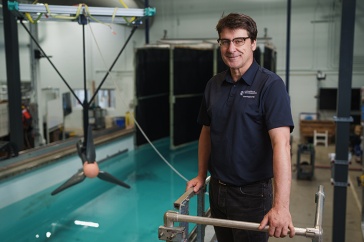
Jackson Kaspari '18 on the job during his Sustainability Fellowship with the city of Dover, New Hampshire. Courtesy photo
In his first months after graduating from UNH, one Dover, New Hampshire, resident helped his city become a first-in-the-nation — while helping the planet at the same time.
Fellow to Fellow
The Sustainability Fellowships program is getting attention across the country.
“We recruit Sustainability Fellows nationally, posting the project descriptions and looking for particular expertise that fit them,” explains Jennifer Andrews of the UNH Sustainability Institute. “We get applicants from all over the world, and it is incredibly competitive. UNH students like Jackson Kaspari compete successfully with talent from U.S. Ivy League universities.
Kaspari has some sage advice for other UNH students who want to become Sustainability Fellows:
- The program is very competitive, so take ample time to do research and prepare your application.
- Be open to projects that may require you to move away for the summer.
- Find the projects that you are best qualified for and make sure to highlight the reasons why your qualifications and experiences make you well-suited for the project.
- Furthermore, come up with a plan of attack. Even though this plan will likely be very far off from the actual summer work plan, it shows that you’ve thought through the project and are already organizing how to approach it.
- Lastly, be sure to express why you care about sustainability.
“Being an active member of the program over the summer was one of the most fulfilling experience’s I’ve had to date. The skills I developed, friends I made and knowledge I acquired over such a brief period is almost unbelievable,” Kaspari says. “As an alumnus, I plan on continuing to stay connected with the UNHSI community and hope to provide aid to the future cohorts of fellows.”
Apply for a Sustainability Fellowship.
As one of almost two dozen 2018 Sustainability Fellows, Jackson Kaspari ’18 has helped Dover conduct the first combined municipal carbon and nitrogen footprint assessment for any local government in the U.S. “The most interesting part of my work this summer was connecting the various stories told by the data to the decisions made by city leaders,” explains Kaspari, who is currently pursuing his doctorate in physical chemistry at UNH, after graduating with a Bachelor of Science degree in chemical engineering in May. An example of how those decisions affected Dover: “The positive impact that retrofitting the streetlights in Dover to LED fixtures had — environmentally and economically,” Kaspari says.
“Jackson worked with the city's planning department to create its first assessment of the impact of carbon and nitrogen pollution resulting from Dover's municipal government operations,” explains Jennifer Andrews, project director with UNH’s Sustainability Institute (UNHSI). Such “greenhouse gas inventories” allow municipal governments “to understand what is driving their contribution to climate change and how to most effectively reduce their levels of pollution,” she says, adding, “Nitrogen pollution isn't as widely recognized as a planetary crisis, but that is in fact what it is. That's why the work Dover did this summer is so important and has the potential to be groundbreaking.”
The Dover Energy Commission spent several months gathering data prior to Kaspari's fellowship, explains Elena Piekut, assistant city planner. "Jackson’s project went far beyond the commission’s greatest hopes by gathering and analyzing data from not only the city’s facilities but also the school buildings, the entire vehicle fleet, fertilizer applications, the schools’ food program and other sources. He also did so in a very organized and thoughtful fashion, setting us up to be able to continue gathering and analyzing data as efficiently as possible."
The project was a perfect fit for Kaspari, whose passion for sustainability is rooted deep in his past experiences. “My parents instilled in me a sense of responsibility,” Kaspari recalls. “Before I could even walk, my Dad was taking me out for hikes — strapped to his back. I feel strongly about helping to conserve the forests that are vital to the health of our planet. In a sense, I was raised to recognize the importance of living sustainably and helping to protect the wilderness.”
UNHSI, meanwhile, has long been at the forefront of sustainability research. “Last December, as part of our usual process for UNHSI's Sustainability Fellowships program, we put out a call for potential sustainability projects for grad students or recent grads to work on over the summer,” Andrews says, and the conversation with Dover officials involved taking advantage of UNHSI's expertise in carbon and nitrogen-footprinting. “To that end, the city proposed a project in which they would host a Sustainability Fellow to do the first-ever joint inventory of the municipal carbon and nitrogen footprint, using UNHSI’s SIMAP,” she says, “making Dover, New Hampshire, the first city in the U.S. to report on both the carbon and nitrogen footprint of its municipal operations.”
The New England Municipal Sustainability Network, which UNHSI partners with, will be looking to this new combined carbon-and-nitrogen inventory as a model for its member cities, Andrews explains. “Jackson did incredible work this summer, and it is so rewarding to be able to support a local citizen, a UNH grad student who does world-class work, as well as a leading New Hampshire community in advancing sustainability here on the Seacoast while creating a model that has the potential to be adopted internationally,” Andrews says.
"Our department has developed a lasting relationship with both Jackson and the Sustainability Institute, and I’m confident that we’ll be able to successfully build on this summer’s project because of those relationships."
"The energy commission and the city council were thrilled to receive Jackson’s report. His analysis and recommendations affect the city in many ways," Piekut says. "Jackson’s work has helped identify more energy projects to prioritize, like replacing portions of the fleet with electric vehicles or adding solar arrays to more city-owned properties. Because nitrogen plays such an important role in the health of Great Bay, Dover has had to take costly measures to reduce the release of nitrogen from the wastewater treatment plant. Jackson’s data helps point to other reduction opportunities, such as limiting fertilizer applications on city and school grounds, or instituting a food composting program or more vegetable-based diet in cafeterias. He did a great job of taking complex datasets from various sources and presenting the information visually in a way that can both educate the public and help city staff and elected leaders make wise long-term decisions."
Kaspari also has high praise for his Piekut as his mentor, for fellow UNH graduate student and nitrogen-footprint expert Alley Leach, who provided insight during his work, and for UNHSI. “At the end of the day, none of these projects would even exist without the dedication of the folks at the Sustainability Institute,” he says. “The fellows program gives me hope for our future. It was very inspiring to see so many talented individuals brought together working toward the same goal of helping our society become more sustainable.”
Sustainable Success
The most important role colleges and universities can play in sustainability efforts is to equip students to become leaders and professionals in the field. That’s the message UNHSI’s Jennifer Andrews would like to share.
“UNH takes pride in the efforts we are making to reduce our energy and water footprints, to cut our carbon and nitrogen pollution, to work toward ‘zero-waste’ goals,” she says, “but even more impactful is our ability to provide seminal educational and professional development experiences for students while assisting local communities, businesses and nonprofits in the region to do the same.”
Such is the vision behind UNHSI’s Sustainability Fellowships program: “To educate and connect the next generation of sustainability leaders while advancing innovative sustainability efforts beyond our own campus,” Andrews says. “It's part of why we have been recognized as the second-most "cool" school by Sierra Club and with a Platinum ranking by AASHE STARS, because we are embedding these sort of experiences in our educational and research endeavors as well as our operational efforts.”
As Andrews sums it up, “Climate change is one of the most pressing challenges civilization faces, and equipping students to understand and to address it isn't just good sustainability education but vital education, period.”
Learn more about the UNHSI.
Kaspari says both his fellowship work and his doctoral research were inspired in part by an undergraduate course he took with associate professor of chemistry Meg Greenslade. “After looking into her research, which focuses on the impact of atmospheric aerosols on climate change, I was inspired to apply for a position working in her lab as a part-time researcher for the summer … She could see my passion and willingness to learn and decided to take a chance on me,” Kaspari explains. “That was the defining moment that led to where I am now.” He spent two years working with Greenslade’s research group and also received grants from the Hamel Center for Undergraduate Research. “I enjoyed my research so much that I decided to stay at UNH to pursue a Ph.D. in physical chemistry, where I am continuing the work with professor Greenslade that I started as an undergrad,” Kaspari says, adding, “If everything goes as planned, I will have at least one and possibly two first-author publications in 2019.”
Andrews applauds Kaspari’s new educational home — the UNH Graduate School — for its support of UNHSI’s work and the Sustainability Fellowships program. “The UNH Graduate School shares UNHSI's vision of training experts and leaders to contribute to the communities in which they live and work as part of their graduate school experience,” she says.
Dovev Levine, assistant dean of the UNH Graduate School and an alumnus of the fellowship program, echoed Andrews’ comments. “My time spent as a fellow back in 2008 really helped me to further my own doctorate work, focusing on campus efforts across the nation related to climate change. Being able to serve as a mentor for the fellowship program in the years since has been beyond inspiring. This program helps get these up-and-coming professionals into the sustainability arena,” he says. The networking aspect of the program — many former fellows remain involved in the program, coming back to educate new fellows and engaging with them on job prospects — “is a shining example of how a program like this should work.”
"We’re very grateful to the UNH Sustainability Institute for making this project happen," Piekut says. "As a mentor, I was able to network with cities and organizations doing similar work around New England. Jackson was able to round out his academic experiences with time immersed in a busy city planning office, understanding municipal operations and communicating science to the public. The best part is that our department has developed a lasting relationship with both Jackson and the Sustainability Institute, and I’m confident that we’ll be able to successfully build on this summer’s project because of those relationships. The report isn’t going to just sit on a shelf."
While Kaspari’s fellowship is complete, he’s not done serving the city of Dover. “My time working for Dover sparked my interest in environmental policy,” he says. “I was recently appointed to Dover’s planning board as an alternate member. This will offer a pathway for me to use my experience from academia to inform sustainable decisions for the future development of the city.”
And after he receives his doctorate?
“I hope to continue in the field of atmospheric chemistry,” he says, “as I feel the field contributes greatly to our understanding of how the climate is changing and may eventually offer solutions to help us negate the problems associated with anthropogenic emissions.”
-
Written By:
Jennifer Saunders | Communications and Public Affairs | jennifer.saunders@unh.edu | 603-862-3585
















































